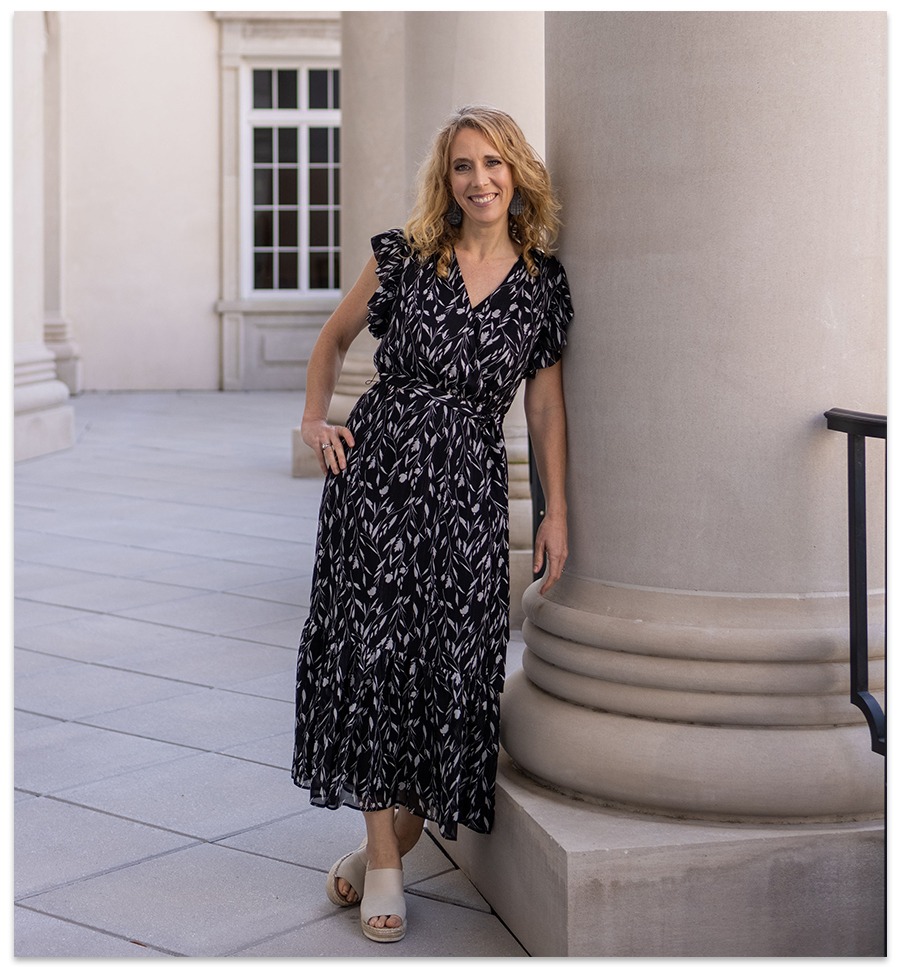
Lissa Frenkel outside the performance hall, which reopened in 2015 after extensive renovations.
WRITTEN BY Stephanie Hunt
PHOTOGRAPHS BY (portrait) Taylor Jordan, (Emerson String Quartet) Jessica Yurinko, (Gaillard Center) Kellie Lawson, & (Little Big Town) JB McCabe
It’s 70 degrees and sunny, a glorious day for an alfresco interview at Theodora Park across the street from the Gaillard Center, where newly planted tulip magnolias, in full fuchsia bloom, have taken center stage. “They just got snow in New York,” says Lissa Frenkel, clearly savoring her first Lowcountry spring after spending the past 20 years in Manhattan. Frenkel joined the Gaillard as president and CEO in July 2021, in the midst of a pandemic pause. But in recent months, the center’s performance schedule, like the tulip magnolias and azaleas embracing the hall, is blossoming again—the Charleston Symphony Orchestra is back in action, school field trips are happening, Spoleto Festival USA soon will be taking up residence, and Frenkel, a Boston-area native and art history major who segued into arts management, is happily in her element.
“I just saw The Magic Flute at the Sottile, then Lyle Lovett’s on tap this week. I can’t wait to hear his voice in our performance hall’s amazing acoustics,” says Frenkel, who averages two or so live performances a week, after full work days. Her impressive cultural leadership credentials include serving as special events manager for the Museum of the City of New York and then as project manager for the Lincoln Center Redevelopment Project, before joining the Park Avenue Armory team in 2006. There, she was instrumental in the years-long effort to transform the massive, architectural marvel into a celebrated unconventional arts hub.
“I’m interested in how adaptive reuse and cultural redevelopment projects [like the Armory] can be a catalyst for city transformation,” says Frenkel, who sees the Gaillard similarly as a game-changing nucleus for the arts in the center of Charleston. Her curiosity regarding the intersection of the arts and urban environments was piqued while working for the 1996 Olympics in Atlanta, shortly after graduating from Emory University. From Atlanta, Frenkel went on to Australia to help prepare for the Sydney games. An outdoors enthusiast whose husband, Alex, co-owns the American Park Network, a company that brings brands and relationships to the national parks and public lands, Frenkel also taught scuba diving Down Under before returning to the States, where she eventually dove into graduate studies, earning a master’s in urban planning from Harvard.
“The arts help us think differently and open up conversations in a new way. I believe people expect us, as the cultural center of an arts-focused city, to take the lead in that.” —Lissa Frenkel
Frenkel returned to New York post-degree where she worked with visionary urban planner, activist, and producer Rebecca Robertson at Lincoln Center. “One day, Rebecca asked if I’d come see this dusty old armory on the Upper East Side,” says Frenkel, who was immediately lured by her colleague’s vision for the 55,000-square-foot National Historic Landmark. Starting from scratch, Robertson, Frenkel, and their team of six raised more than $215 million to turn the crumbling armory into a gleaming arts hub capable of hosting monumental, immersive, innovative works that can’t be mounted in traditional performance halls and museums. “It was a matter of understanding where the gaps were and what was needed in the community, and responding creatively,” she says.

Center Stage: The Gaillard Center (middle) hosts a full calendar of touring productions and performances, including The Emerson String Quartet (left) and Little Big Town (right).
With the Gaillard, Frenkel inherited a facility that already gleams and a performance and outreach program that fills many gaps, rounding out what is offered by Spoleto, the College of Charleston, and community theaters, as well as smaller companies and organizations. “This is such an amazing space,” says Frenkel. “My vision is for the greater community to engage with the Gaillard even more than it already does. I see us activating every inch of our campus, not just the performance hall.” She plans to continue bringing a “high-quality lens” to touring productions that are a bedrock of the center’s busy performance calendar, but also to begin to curate and commission original work.
“Martha Rivers Ingram envisioned the Gaillard as the community’s largest arts classroom. We already reach more than 20,000 children a year—mostly Title 1 elementary students, and we’re hoping to expand that to more middle and high school students,” says Frenkel, mom to a 12-year-old daughter and eight-year-old son. With the Gaillard’s location “at the heart of the ‘Inspiration Corridor’” (which includes the soon-to-open International African American Museum, the South Carolina Aquarium, Charleston County School District headquarters, Mother Emanuel AME Church and its forthcoming memorial park, and the College of Charleston and its Halsey Institute of Contemporary Art), she’s eager to expand the Gaillard Center’s reach and collaborations. “The arts help us think differently and open up conversations in a new way,” she says. “I believe people expect us, as the cultural center of an arts-focused city, to take the lead in that.”
Program Notes
INSPIRATION: “Artists illuminating difficult topics through their work, taking risks or solving issues with creativity that surprises and delights”
CAN’T WAIT: “I’m excited for the last bit of Broadway this season with Beautiful, the Carole King Musical on May 10 and 11, as well as hosting many of Spoleto’s exciting programs, including Yuval Sharon’s interpretation of the classic opera La Bohème.”